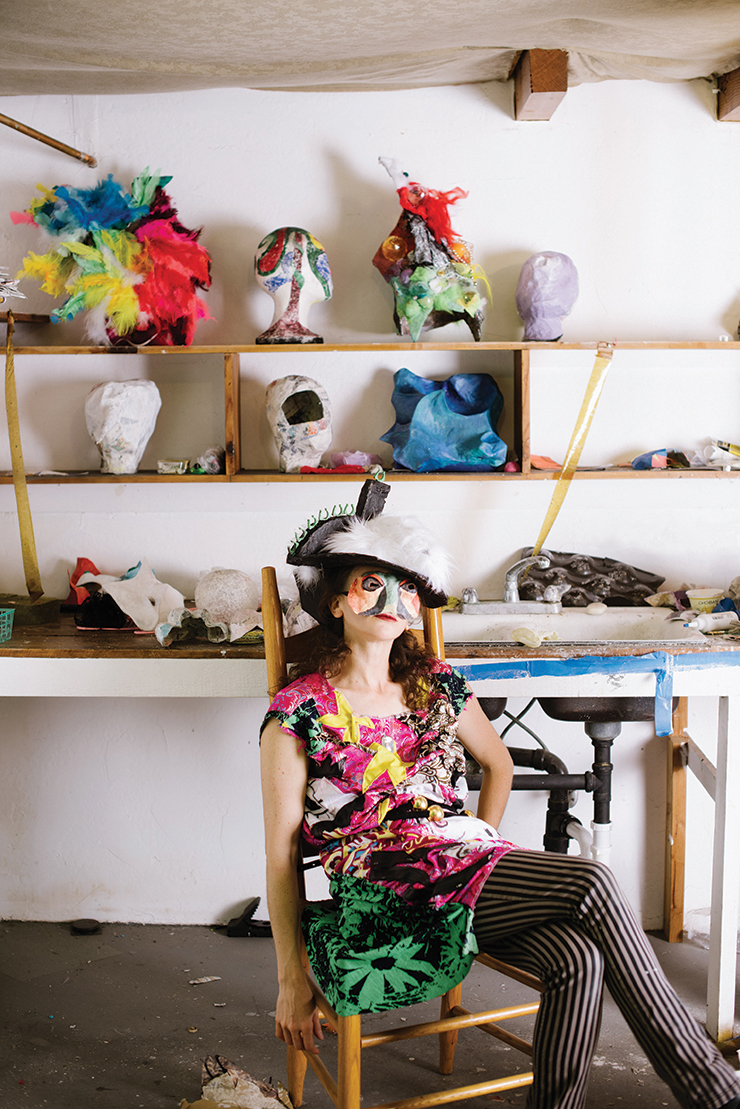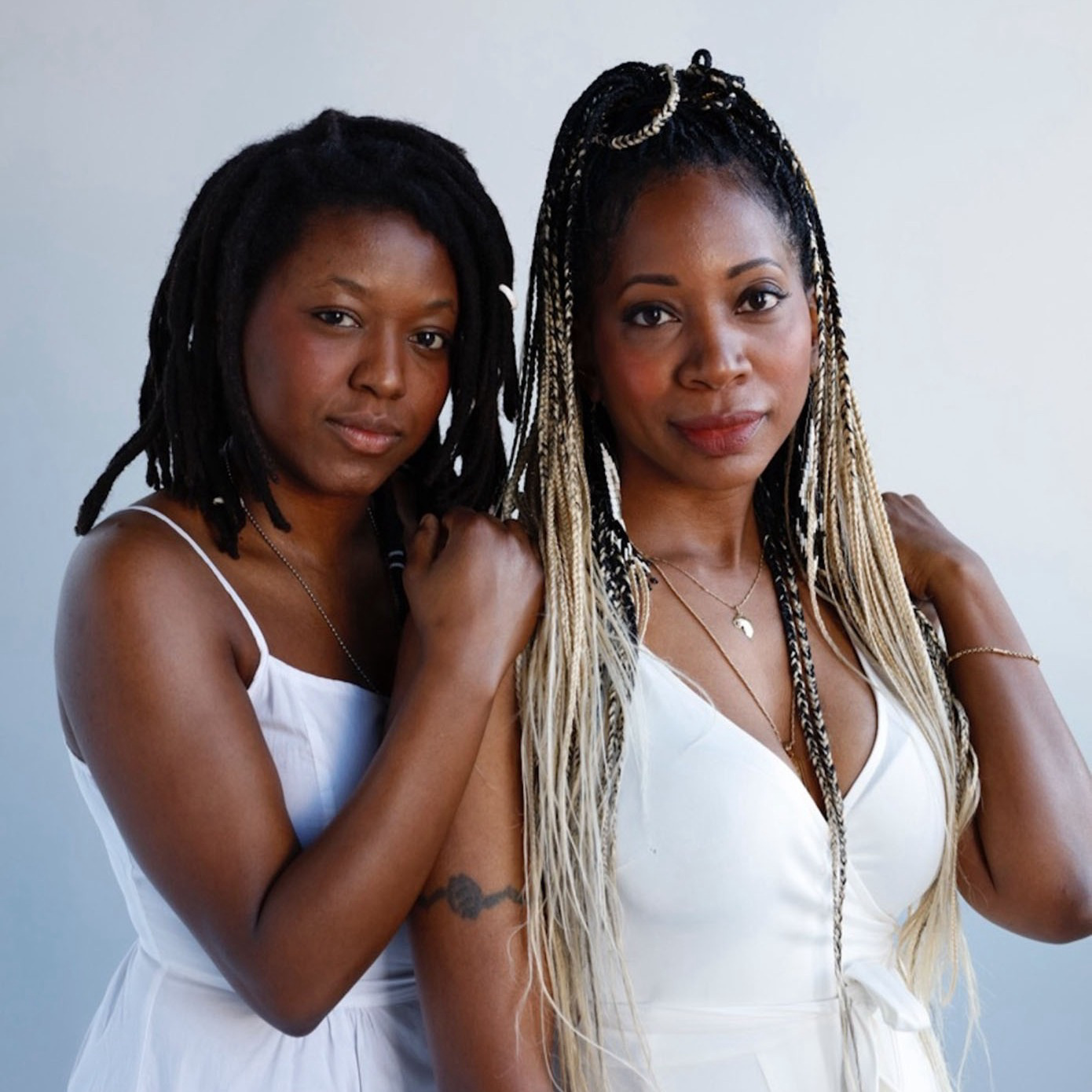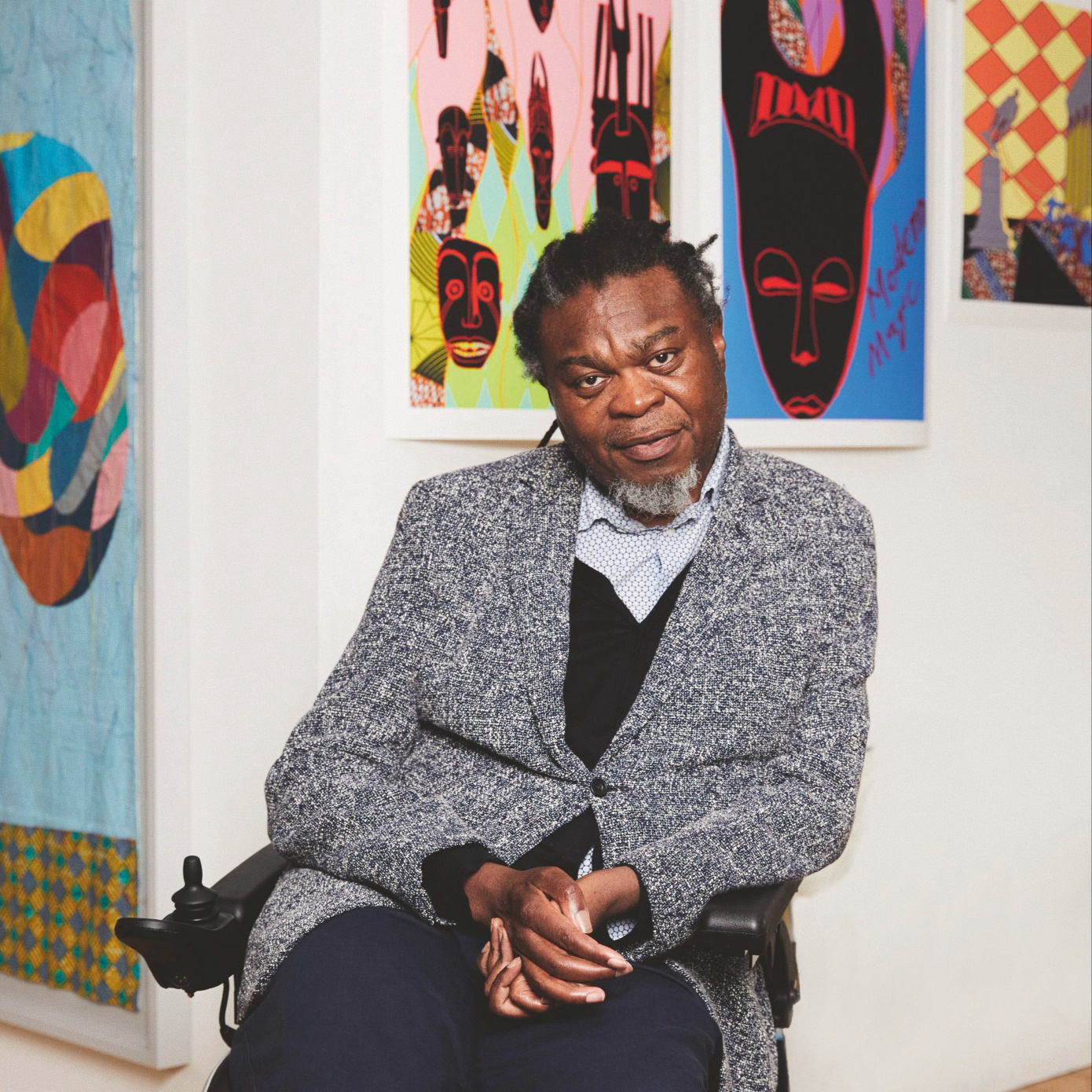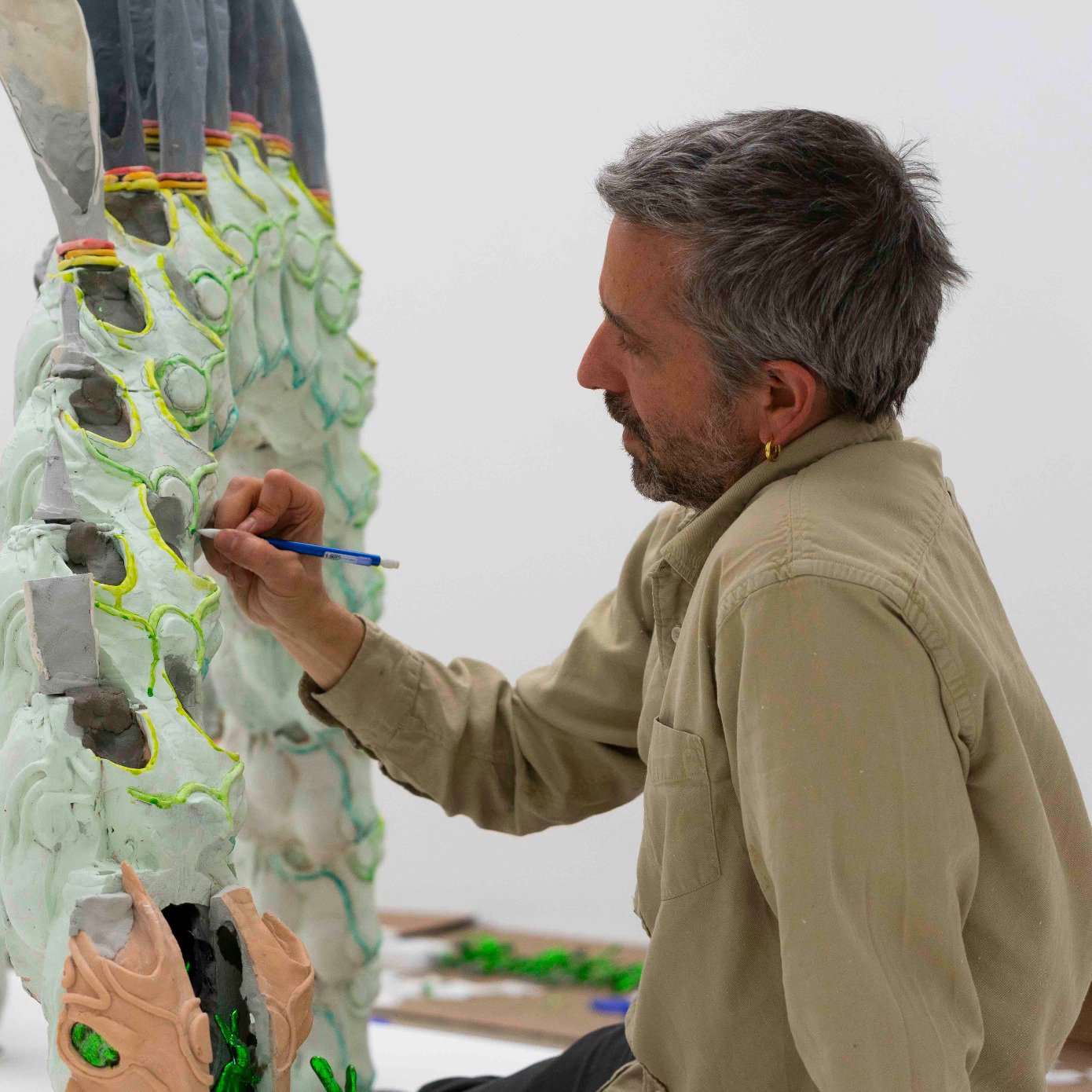
Watch your head,” says Rachel Mason. “I’ve hit mine so many times down here.” We’re descending slowly into her new studio—situated behind the dusky boiler room of her West Hollywood apartment building—but despite Mason’s fair warning, I narrowly avoid braining myself on a foam-wrapped water pipe and the jamb of the three-foot-high, Wonka-esque door leading into this subterranean workspace.
Once safely inside, however, my gaze is immediately drawn to a vibrant green screen engulfing nearly half of the basement. Scattered about the verdant backdrop, which is used for her film work and curls across the floor and up the ceiling in an emerald wave, are two microphone stands that punctuate an outcropping of painted papier-mâché masks fitted with proboscises and headdresses of varying sizes (from a rainbow of craft feathers to a whitewashed tree branch). The shelves sparkle with glittery costumes and reflections of the broken mirror dresses on a few of her Starseeds dolls—an Arte Povera chorus of her female art (Joan Jonas, Yayoi Kusama) and celebrity (Joni Mitchell, Madonna) icons—made with CelluClay heads attached to porcelain doll bodies: “They are women I loved who were intimidating to me.” In this context, it’s easy to understand how, Mason says, “These basement storage units tend to be fruitful for me.” After all, she started building this chorus, which has gone on to star in shows at New York’s envoy enterprises and ltd los angeles, inside “a dark dungeon space” in Sunnyside, Queens.
While these grotesque figures might read as kitschy Pop Art mashups of Greer Lankton’s creatures and Wayland Flowers’ Madame puppet, they function more as panoramic windows looking out onto every touchstone of Mason’s multimedia practice, from her days free climbing the eight-story Dickson Art Center at UCLA as an undergrad to her decade-long pursuit of transcendent performance that mixes sculpture and songwriting, film and costume, installation and provocation in the form of witty and soulful social commentary.
“It could be that my best work just gnaws at me in a really uncomfortable way,” admits Mason. “I can’t figure it out, and I’m disturbed by it.”

This discomfort reached its first apogee with the Bush administration’s invasion of Iraq, when Mason was working on her MFA in sculpture at Yale. “Every person in the Bush administration went to Yale, and here I am, this L.A. kid at the epicenter of power in our country,” recalls Mason, who grew up in the Hollywood Hills just above the Sunset Strip. She attended the same secondary school as Leonardo DiCaprio, and dove deep into punk and queer culture during high school (she took a girl to prom), while falling in love with David Bowie, Patti Smith and PJ Harvey along the way. “I was really obsessed with musicians who felt like they were artists,” she says. “People with huge personas were exciting to me.”
Her mother was a journeyman crime reporter, and her father worked as a part-time special effects man (on Star Trek and 2001: A Space Odyssey) and served as Jim Morrison’s cameraman at UCLA film school. The Masons later took jobs distributing Hustler for Larry Flynt, which led to them buying out one of their clients in what is now the landmark Circus of Books gay erotica store. Mason’s friend, artist John Knuth, later ran the acclaimed Circus Gallery, showcasing such talents as Dawn Kasper and Julian Hoeber from their storage space. (She is currently co-directing a documentary about her parents’ unlikely roles as icons of the LGBT community.)
Mason’s career is built on a bit of serendipity, as well. “I really didn’t decide or choose to do music and it didn’t seem like I could get my head around that. I was more inclined toward just making objects,” she says, noting the image for her seminal Kissing President Bush sculpture—of herself locking lips with the 43rd POTUS—grew out of a vision she had before going to bed one night in 2003.
Just as that piece received critical success in The New York Times, Mason was already on to her next target: heads of state involved in war. “Being alive during the time of these wars, we’re all feeding into it,” she says. “I’m pretending to be an ambassador as a little penance.”
As such, Mason sculpted every leader of a wartime nation—and sung in character as leaders like Manuel Noriega and Saddam Hussein, robbing them of their power with her Russian doll portraits and heart-stopping voice—for her epic six-year Ambassadors series. She also spent several years teaching art at the maximum security Sing Sing Correctional Facility (where she was brought to tears by an inmate re-enacting a painting from her mentor at UCLA, John Baldessari); recorded more than a dozen albums (including Das Ram, which just dropped in November); assisted her idol Joan Jonas (who fired her after being floored by one of Mason’s performances); and accidentally discovered the tale of the cannibal and child killer Hamilton Howard “Albert” Fish while working on a performance in 2007. Mason had begun researching people who had been executed at the prison and learned that Fish was one of the oldest inmates ever electrocuted at Sing Sing in 1936 at the age of 65.

“I looked up the date Fish was killed because that’s fun to do. Who knew that would lead to this 10-year odyssey?” says Mason, referring to the rabbit hole she dove into after seeing a newspaper clipping featuring obituaries for the convict Hamilton Fish and former New York State Speaker Hamilton Fish II on the same page. Over the next five years, she wrote a sprawling rock opera, The Lives of Hamilton Fish, and ultimately filmed a hypnotic feature-length film from it featuring Bill Weeden and Theodore Bouloukos. Mason shot all over New York, including at Aaron Burr’s upstate mansion and in the halls of Sing Sing. “They were holding back inmates and there’s a real prison guard in that shot,” she says of the lusciously staged drama, in which she plays a Ziggy Stardust sendup of the editor of the Evening Star News, a local nightly paper Mason discovered in Peekskill, New York. “I wanted to give voice to this very unlikely behind-the-scenes character who embodies what many of us have now become: editors of stories. No one is ever aware of this huge amount of thought that goes on in the back end of presenting the stories that we read. I would never have made this film had not an editor of some tiny paper thought to put those two stories nearly side by side.”
As for Mason’s performance in the film, it was intentionally “very frontal” because performing into the camera was a wink to the conceit of her voice coming out of everyone’s mouth (a fortuitous cost-cutting method). “I wanted the story to feel first-person driven with this contemporary twist through the minds of these historical people,” she explains. After live performances alongside screenings of the film at LACMA and Night Gallery to raves, Mason is now embarking on an interstellar trip. Through December 22, the artist will give a handful of performances based on her new rock opera about the lives of stars at the Hammer Museum as part of its In Real Life: Studio series. She's also working up a dervish of a performance for Miami where she'll be participating in The Artist as Composer panel, reflecting on music as a medium, at Art Basel.
Hammer curator Ali Subotnick thinks Mason is unparalleled in her approach. “She’s not your typical performance artist, she’s pulling from the history of theater and musicals but the visual art is really present,” says Subotnick. “A lot of performance art is redundant and rehashes the same concepts, but she has this voice that’s really quite disarming and she has such an interesting view on culture and politics and then bridges it with her own autobiography.” In other words, she's redefining what it means to be Masonic.




